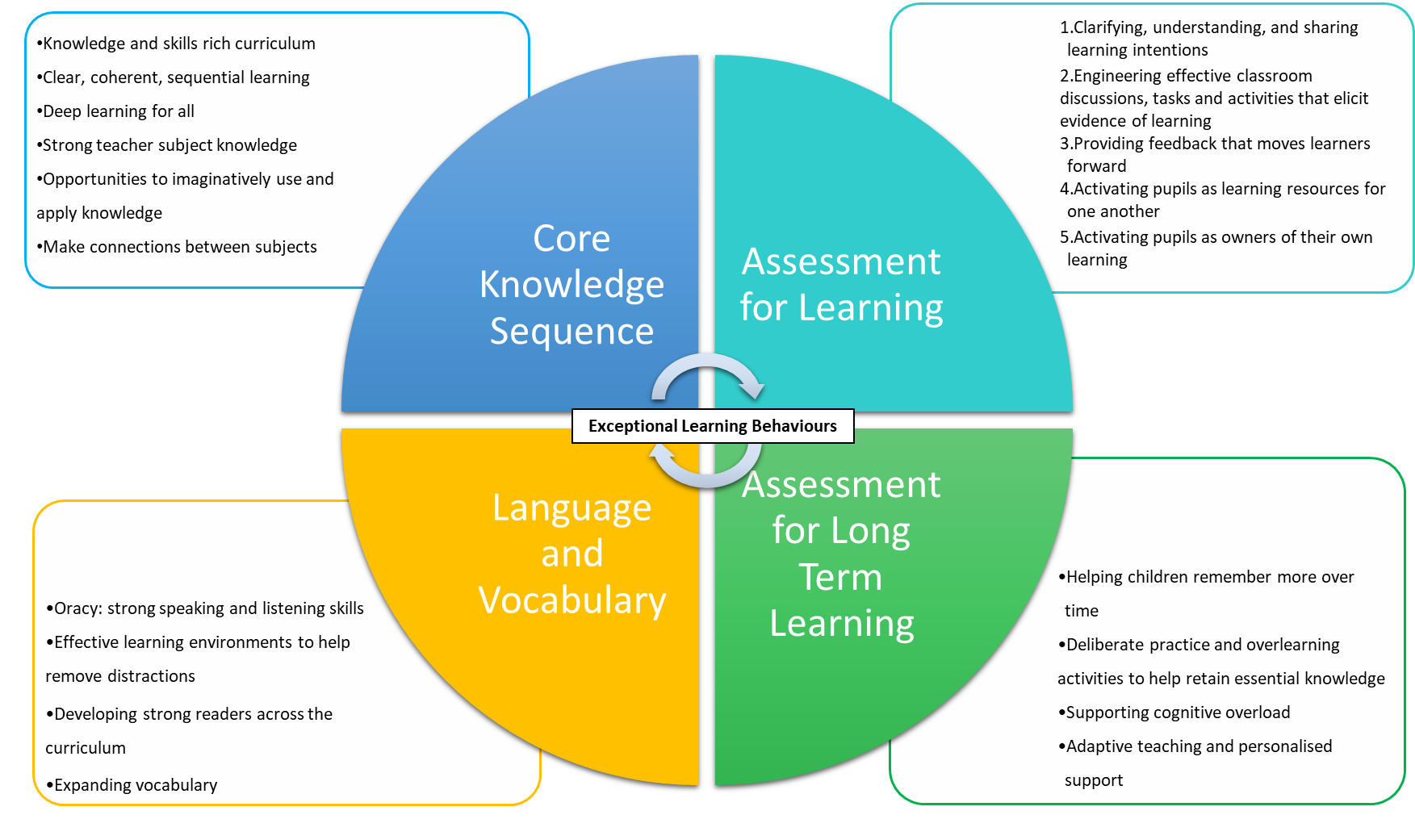Curriculum: Learning in School & Home
Our reputation for academic excellence is reflected in our SATs results and regular, low-stakes testing from Year 1.
However, our school is known for much more than our academic results; we place emphasis on the importance of reading and the core subjects of English and Maths, but are committed to providing children with a broad curriculum which is led by teachers who are passionate about their subjects areas. Outside the school day, children are encouraged to widen their learning by joining a range of extra-curricular clubs and activities.
We encourage our children to understand the connection between their learning behaviour and their accomplishments. Our reward system prioritises the effort that children have made. We encourage our children to challenge themselves to work hard and be their best.
For more information about our three B’s, visit the school's Vision Statement.
Our curriculum offer can be summarised by the following diagram:

We continue to develop a highly structured, knowledge-rich curriculum built around a core knowledge sequence, enabling children to acquire knowledge in small, sequential steps within each subject. Clear, coherent and sequential learning is carefully planned, so that children know more and remember more, building this into their long-term memory over time. We provide opportunities for deep learning within each subject. More time is taken on each element of knowledge so that it can be understood more deeply and connections can be made across different subjects. Once children have achieved age-related expectations, they can look into these areas in greater depth and with greater challenge.
Oracy plays an essential role in helping children develop strong communication skills, including the ability to ask questions, and to deepen their learning so that they can approach tasks both collaboratively and independently. We use the principles of dialogic talk as a key element of our teaching pedagogy. Click here to view our dialogic talk progression document. This approach supports our reading and vocabulary-rich curriculum.
Rigorous assessment procedures ensure that no child is left behind. Assessment for Learning strategies help teachers and children acquire new knowledge and skills. Our feedback policy focusses on Dylan William's five strategies for 'Embedding Formative Assessment':
- Clarifying, understanding, and sharing learning intentions
- Engineering effective classroom discussions, tasks and activities that elicit evidence of learning
- Providing feedback that moves learners forward
- Activating pupils as learning resources for one another
- Activating pupils as owners of their own learning
Assessment for Long Term Learning helps teachers understand what children have learnt and helps children embed learning in their long-term memory. We facilitate carefully chosen activities to help children retain essential knowledge and skills. We provide personalised support to all children, including those with physical, behavioural or learning difficulties, so that they have what they need to access the curriculum. We ensure that we do not overload children’s working memory and use a variety of strategies to help children learn more and remember more over time. We use funding streams carefully to ensure that children, for example those with SEND or in receipt of the Pupil Premium, make rapid progress to attain age-related expectations and have experiences that enrich their learning to help them increase their vocabulary and knowledge.
Teachers plan opportunities in all subjects for pupils to think in different ways, find different solutions, create original designs, make connections between subjects and imaginatively use and apply knowledge. Music, drama and sports activities are highly valued as part of the broader curriculum to enrich the knowledge and skills taught in subject lessons.
We have a strong, nurturing ethos where we are committed to developing each and every child as an individual. Working in close partnership with children and parents, we hope to foster an ethos of mutual respect and co-operation within a secure and stimulating environment.
Spiritual, moral, social and cultural education (SMSC) is threaded throughout school life to prepare pupils for life in modern Britain and teach them how to keep safe. We enable our pupils to succeed through challenging tasks and activities that encourage them to take risks and be creative. We develop their ability to think independently, enabling them to transfer their learning to all aspects of their lives, thus preparing them for the future. Please click here to access our personal development offer and here to access our personal development overview.
We promote the rich diversity of Britain and the wider world so that pupils can engage with society and understand their place in it, irrespective of their circumstances, special needs or disability. We are committed to the active promotion of the four fundamental British values through the Personal Development Curriculum and subject curricula as part of Spiritual, Moral, Social and Cultural education:
-
Democracy
-
The rule of law
-
Individual liberty
-
Mutual respect and tolerance.
We carefully plan for special events that support this ethos. This may include a school trip, visitors to school or a planned event. Such events may be planned for the beginning, middle or end of a topic to provide a link to previous learning; develop enquiry-based learning; acquire new knowledge and vocabulary and place learning in context or to deepen/master learning.
Click here to access our 'positive news' communication for more information on our wide-ranging trips and visitors.
Click here to access our 'what's on page'.
To access subject-specific curriculum documentation, please follow the links in the left-hand column on this page.
If you would like further information regarding the curriculum, please access the guide below or contact Richard Street at admin@bramhopeprimaryschool.co.uk
